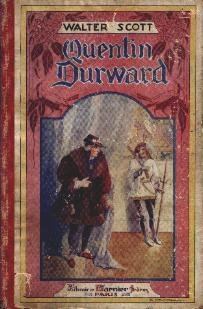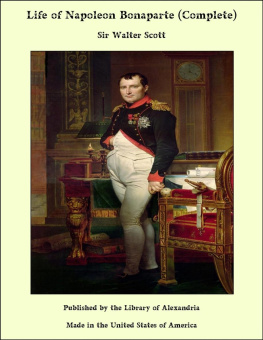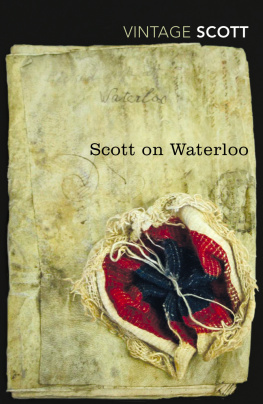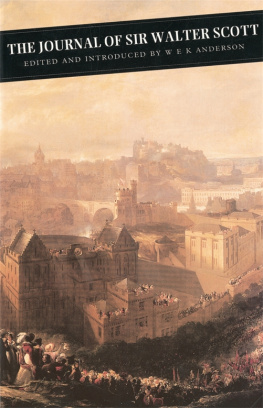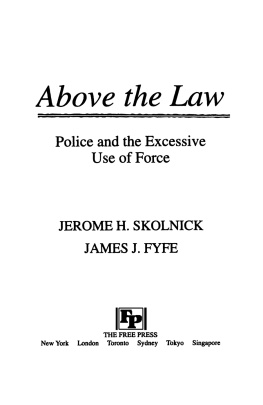EDINBURGH
UNDER SIR WALTER SCOTT
BY
W. T. FYFE
WITH AN INTRODUCTION BY
R. S. RAIT
LONDON
ARCHIBALD CONSTABLE
AND COMPANY, LTD.
1906
Edinburgh: T. and A. CONSTABLE, Printers to His Majesty
INTRODUCTION
In the end of the eighteenth century and the beginning of the nineteenthfrom, approximately, the death of Samuel Johnson in 1784 to that of Walter Scott in 1832Edinburgh, rather than London, was the intellectual centre of the kingdom. It would, of course, be easy to show that London has never lacked illustrious men of letters among her citizens, and, in this very period, the names of Sheridan, Bentham, Blake, Lamb, and Keats at once occur to memory as evidence against our thesis. It must also be admitted that Edinburgh shares some of her great names with London, and that many of the writers of the time are associated with neither capital. The name of William Cowper recalls the village of Olney; the English Lakes claim their great poets; and Byron and Shelley call to mind Greece and Italy, as, in the earlier part of our period, Gibbon is identified with Lausanne. But the Edinburgh society which Scott remembered in his youth or met in his prime included a long series of remarkable men. Some of them, like Robertson the historian; Hugh Blair; John Home, the author of Douglas ; Henry Mackenzie, 'The Man of Feeling'; John Leyden; Dugald Stewart; and John Wilson, 'Christopher North,' were more or less permanent residents. Others, like Adam Smith, Thomas Campbell, Lady Nairne, Thomas De Quincey, Sir James Mackintosh, and Sydney Smith, spent a smaller portion of their lives in Edinburgh. Not only was the city full of great writers; it produced also a series of great publishersthe Constables and the Blackwoods. The influence of the Edinburgh Review can scarcely be realised in these days of numberless periodicals, and it was from Edinburgh that its great rival, the Quarterly , drew much of its early support, and one of its great editors, John Gibson Lockhart. Edinburgh, moreover, was still a national metropolis, for the railway systems had not yet brought about the real union of England and Scotland, and it possessed a society not less distinctively Scots than the Established Church or the code of law. The judges who administered that law add still further to the interest of the scene. Some were men of great intellectual force, whose names still live in the history of English thought. Lord Hailes, the antagonist of Gibbon, and Lord Monboddo, who, in some sense, anticipated a discovery of Mr. Darwin, lived on to the close of the eighteenth century, and, in the early nineteenth, their reputation was sustained by Lord Woodhouselee, Lord Jeffrey, and Lord Cockburn. Others of the judges were notable for force of character, like Lord Braxfield, now familiar as 'Weir of Hermiston,' or for mere eccentricity, like Lord Eskgrove, one of the strangest beings who ever added to the gaiety of mankind.
The natural centre of this remarkable society is the great figure of Sir Walter Scott, who dominated Edinburgh during a large portion of the period, and the story of whose life has made so many Edinburgh names household words for all time. Lockhart's Life of Scott gives an interesting, though by no means a complete, picture of this society. There are many other sources of information: the Scots Magazine , the Annual Register , and so forth. Most important of all are the autobiographies of Alexander Carlyle and Lord Cockburn, two books which it is becoming more and more difficult to obtain. 'Jupiter' Carlyle of Inveresk was born in 1722, and lived until 1805. He could thus recollect the Porteous Mob; he had seen Prince Charlie in Edinburgh, and, from the garden of his father's manse at Prestonpans, he had watched the flight of General Cope's defeated troops. He had been the friend of David Hume, who died just before our period begins, of Smollett, and of Robertson and Adam Smith. Such a man had much to tell, and, fortunately for posterity, he chose to tell it. Not less interesting or important is the volume known as Memorials of his Time , by Henry Cockburn, who, from 1834 to his death in 1854, was a Scottish judge. He was born in 1779, and had been a member of a famous Edinburgh debating societythe 'Spec'along with Henry Brougham, Francis Horner, Walter Scott, and Francis Jeffrey. He shared Jeffrey's politics, aided him in defending Radicals charged with sedition, and wrote his biography. His Memorials are by far the best source of our knowledge of social life in Scotland in the early years of the nineteenth century. Carlyle and Cockburn both wrote freely and without reserve, and each possessed an accurate memory and an appreciation of the picturesque. From these and similar materials Mr. W. T. Fyfe, an Edinburgh citizen, who possesses a wide and affectionate knowledge of his home and its history, has skilfully drawn his picture of Edinburgh under Sir Walter Scott. His book is no mere addition to the numerous lives of Sir Walter. It takes the well-known incidents of his career as affording some guiding lines for the grouping of the varied details, and the reader of Lockhart will find here fresh light upon some familiar names. The personality of the best-loved Scotsman who ever lived dominates this book as it dominated the real life of which it tells. The cords of a man and the bands of love still bind us to the Shirra o' the Forest, and even to the Laird of Abbotsford; there is none other among the mighty dead whose ways and whose home we know so well as those of the Great Unknown. He is not to be envied who can resist the personal spell of the Wizard:
'O great and gallant Scott,
True Gentleman, heart, blood, and bone,
I would it had been my lot
To have seen thee, and heard thee, and known.'
Even those who are wise enough to read their Lockhart and the Letters and the Journals once a year will learn something about Scott from this book, and much about the friends whom he has immortalised in some of the sweetest strains that friendship ever inspired.
ROBERT S. RAIT.
NEW COLLEGE, OXFORD,
September 1906.
DESCRIPTION OF EDINBURGH
(From The Abbot , Chapter XVII.)
'The principal street of Edinburgh was then, as now, one of the most spacious in Europe. The extreme height of the houses, and the variety of Gothic gables and battlements, and balconies, by which the skyline on each side was crowned and terminated, together with the width of the street itself, might have struck with surprise a more practised eye than that of young Graeme. The population, close packed within the walls of the city, and at this time increased by the number of the lords of the King's party who had thronged to Edinburgh to wait upon the Regent Murray, absolutely swarmed like bees on the wide and stately street. Instead of the shop-windows, which are now calculated for the display of goods, the traders had their open booths projecting on the street, in which, as in the fashion of the modern bazaars, all was exposed which they had upon sale. And though the commodities were not of the richest kinds, yet Graeme thought he beheld the wealth of the whole world in the various bales of Flanders cloths, and the specimens of tapestry; and, at other places, the display of domestic utensils, and pieces of plate, struck him with wonder. The sight of cutlers' booths, furnished with swords and poniards, which were manufactured in Scotland, and with pieces of defensive armour, imported from Flanders, added to his surprise; and at every step, he found so much to admire and to gaze upon, that Adam Woodcock had no little difficulty in prevailing on him to advance through such a scene of enchantment.



